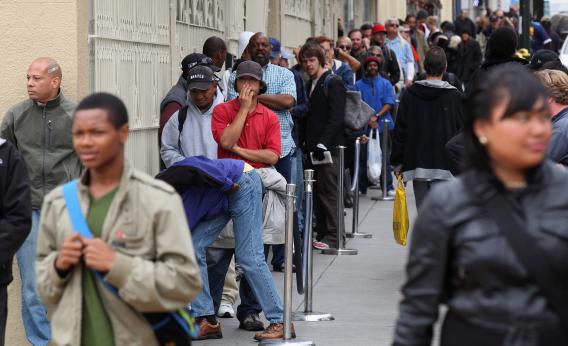 A soup kitchen line
A soup kitchen linePhoto by Justin Sullivan/Getty Images.
When the economy crashed in 2008, millions of Americans lost their jobs. Applications for food stamps soared. So did attendance at emergency food providers?soup kitchens and food pantries?that help the estimated 50 million people, working and non-working, who can't afford enough groceries to get through the month.
Unlike in past economic downturns, though, the welfare rolls barely budged. Where 15 years ago 68 percent of poor Americans received cash via Temporary Assistance to Needy Families (as welfare was officially renamed in 1996), today only 27 percent of Americans with incomes low enough to qualify for cash benefits receive them. As the New York Times' Jason DeParle discussed in a front-page article earlier this year, the resulting welfare gap has left at least 4 million families with neither jobs nor cash aid.
The size of the welfare gap, however, varies widely from state to state. In states like California and Maine, which have focused on getting their poor citizens into jobs programs, about two-thirds of those eligible still receive welfare. On the opposite end of the spectrum is Georgia, which over the past decade has set itself up as the poster child for the ongoing war on welfare. Even as unemployment has soared to 9 percent and 300,000 Georgia families now live below the poverty line?50 percent higher than in 2000, for a poverty rate that now ranks sixth in the nation?the number receiving cash benefits has all but evaporated: Only a little over 19,000 families receiving TANF remain, all but 3,400 of which were cases involving children only. That's less than 7 percent, making Georgia one of the toughest places in the nation to get welfare assistance.
What's Georgia's secret? According to government documents, interviews with poor Georgians, and those who work with them, it's a simple one: Combine an all-Republican state government out to make a name for itself as tough on freeloaders; a state welfare commissioner so zealous about slashing the rolls that workers say she handed out Zero candy bars to emphasize her goal of zero welfare; and federal rules that, regardless of who's in the White House, give states the leeway to use the 1996 law's requirement for "work activities"?the same provision that Republicans have charged President Obama wants to unfairly water down?to slam the door in the face of the state's neediest.
What this has created is a land that welfare forgot, where a collection of private charities struggle to fill the resulting holes. For the Atlanta Community Food Bank, that means sending out more than 3 million pounds of canned goods, bread, and other groceries each month to churches in and around Atlanta to help feed the state's growing number of poor and near-poor. The food bank?s staff also helps arrange for free tax prep services, and helps the city?s poor apply for food stamps and Medicaid. One thing they don't discuss, though, is welfare. "We don't talk about TANF anymore," says food bank advocacy and education director Laura Lester. "We don't even send anybody in to apply, because there's just no point."
It's a state of affairs that's left an increasing number of Georgians with nowhere to turn. Teresa, a single mom of a 2-year-old living in a domestic violence shelter, tells of how she broke down and applied for cash benefits after fleeing an abusive relationship?only to be chastised by state welfare officers who asked, "Wouldn't you rather work?" Eventually, Teresa says, "I was sitting there crying?I just didn't know what else to do. I said, you've gone from letting people sit on their butt and collect money to the very opposite of that."
Ultimately, it didn?t matter. In the end, she was rejected for failing to fill out her paperwork correctly.
One of the common misconceptions about welfare reform is that once Newt Gingrich and Bill Clinton had settled their grand bargain back in 1996, a new regime was put in place: If you won't work (or at least look for work), you'll no longer get a government check. In fact, though, welfare reform is less a single law than 50 separate experiments, as Washington provided states with a broad framework under which they are free to set their own rules on time limits, grant levels, and work requirements for those seeking help.
Immediately after the new law was put in place, the welfare rolls plunged by two-thirds?though no one could say for certain whether this was because people were leaving the rolls for jobs or merely sinking deeper into poverty. And though the slide eased a bit nationally after the economy cooled around 2001, the welfare gap?the number of people poor enough to receive benefits who weren?t actually getting them?still amounted to nearly two-thirds of those below the poverty line.
Source: http://feeds.slate.com/click.phdo?i=321f51f943343610d5adf0cf92225988
pro bowl pro bowl 2012 rick santorum daughter gainesville 2012 royal rumble the grey machine gun kelly
কোন মন্তব্য নেই:
একটি মন্তব্য পোস্ট করুন